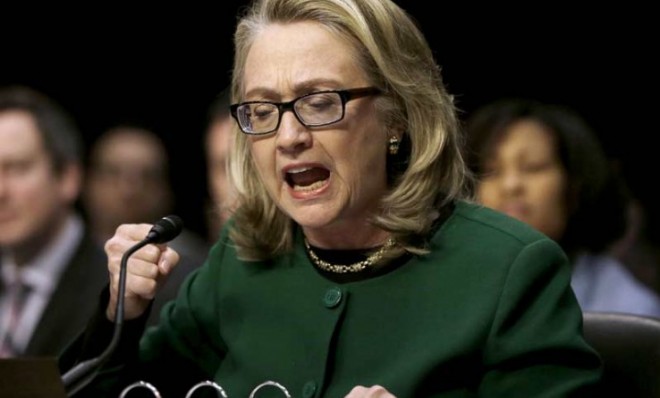On Benghazi, Clinton gets mad
"For me, it's not politics, it's personal."


A free daily email with the biggest news stories of the day – and the best features from TheWeek.com
You are now subscribed
Your newsletter sign-up was successful
Marco Rubio, the senator from Florida, was calm and grounded as he questioned Secretary of State Hillary Clinton on warnings and indications before the Benghazi attack. And Rubio has aspirations that may mean that his colloquy with Clinton will make the 2016 clip reels. Scoring political points was not his intention, and Clinton answered respectfully.
But it was an exchange with Sen. Ron Johnson, a Republican who has been obsessed with the rhetorical aftermath, almost to the point of myopia, that gave Clinton the chance to both vent her anger at what she saw as an irrelevant line of questions as well as demonstrate how formidable a political figure she has become.
Johnson asked why there were different explanations offered at different times, and accused Clinton of "intentionally misleading" Americans.
The Week
Escape your echo chamber. Get the facts behind the news, plus analysis from multiple perspectives.

Sign up for The Week's Free Newsletters
From our morning news briefing to a weekly Good News Newsletter, get the best of The Week delivered directly to your inbox.
From our morning news briefing to a weekly Good News Newsletter, get the best of The Week delivered directly to your inbox.
"We had four dead Americans!" she said, banging the table in front of her. "Whether it was [an] attack preplanned by terrorists or... a guy out for a walk one night who decided they'd go kill Americans ... What difference does it make?"
She called Johnson's insinuation "the biggest fairy tale I've ever seen."
Sen. John McCain later tried to pick up Johnson's ball. "Good to see that you are as healthy and combative as ever," he began.
"I categorically reject your explanation as to why [investigators didn't ask survivors the next day what had happened]," he said.
A free daily email with the biggest news stories of the day – and the best features from TheWeek.com
McCain asked Clinton why the administration refuses to release reactions in classified cables that appear to show that there was a real-time source of information about al Qaeda's involvement. He accuses her, essentially, of perpetuating a falsehood. "The American people still have not gotten the answer they deserve."
Clinton began by praising McCain's passion. But she parried his jabs by simply saying that she and he "just have a disagreement about what happened when explaining the sequence of events. .. We had no access to the surveillance cameras for weeks. But with respect to helping Libyans ... since March 2011, Congressional holds were placed on help for Libya... and we've gotten frequent complaints from Congress about why we're doing anything at all for Libya. So, we've got to get our act together between the administration and Congress if we are serious."
Sen. Jeff Flake also wondered why provisional information was given to the American people.
Clinton's explanation: "Maybe the default should be, just withhold. Don't say anything... until we've decided. But that's not who we are as American officials. We all wish that anyone had never raised doubt, but Ambassador Rice...and other administration officials were speaking off of the best determined talking points."
Marc Ambinder is TheWeek.com's editor-at-large. He is the author, with D.B. Grady, of The Command and Deep State: Inside the Government Secrecy Industry. Marc is also a contributing editor for The Atlantic and GQ. Formerly, he served as White House correspondent for National Journal, chief political consultant for CBS News, and politics editor at The Atlantic. Marc is a 2001 graduate of Harvard. He is married to Michael Park, a corporate strategy consultant, and lives in Los Angeles.
